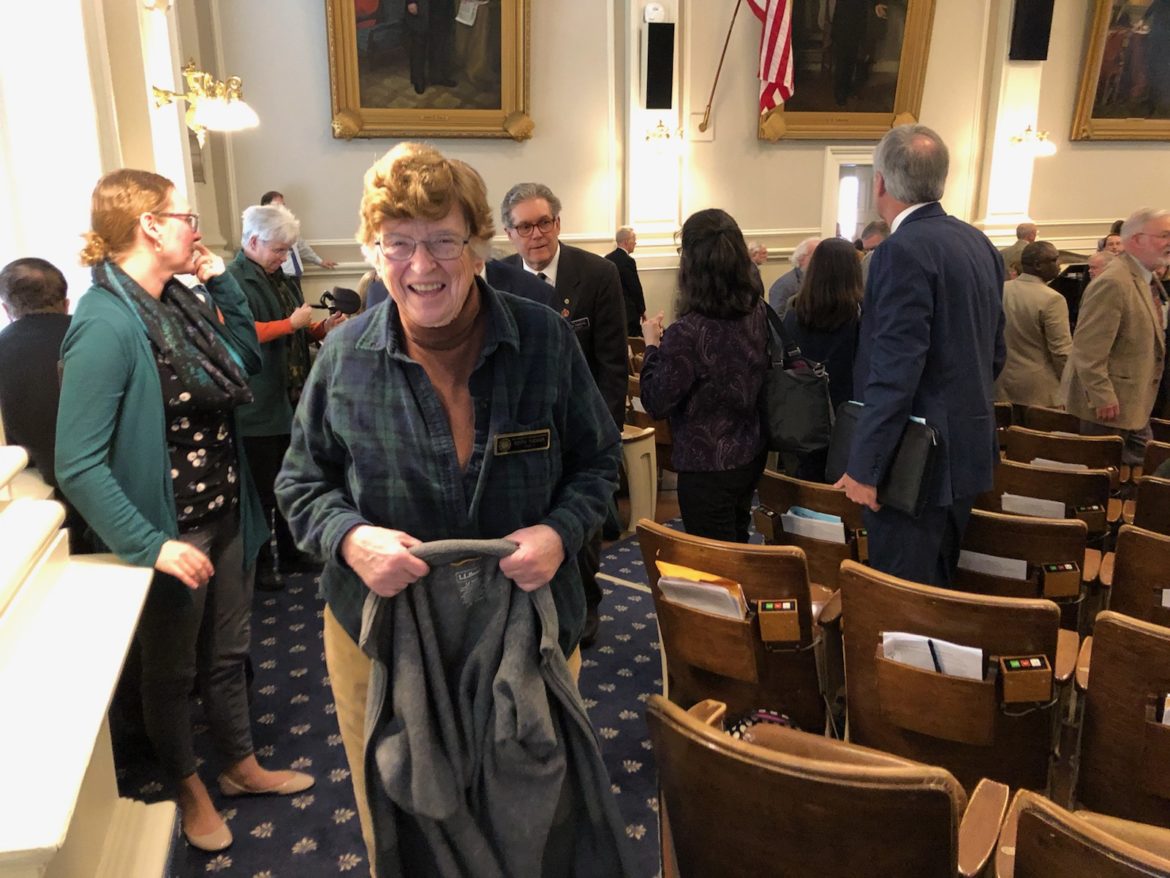By GARRY RAYNO, InDepthNH.org
CONCORD — The House voted to initially approve a bill to protect older vulnerable adults from exploitation Wednesday.
The House voted 206-144 to approve House Bill 1660, which would help a vulnerable adult leave an abusive or exploitative environment and to seek protective orders when necessary.
A similar bill was vetoed by Gov. Chris Sununu last year and was vigorously opposed by gun rights advocates.
This session HB 1660 supporters said they addressed many of the governor’s concerns, but opponents said they did not go far enough.
All Republicans at the session voted against the bill along with two Democrats.
Rep. Lucy Weber, D-Walpole, said the gun confiscation issues have been addressed, but more needs to be done to protect vulnerable senior citizens.
“Victims of
domestic abuse already have an avenue for relief, children have an avenue to
relief,” Weber said. “The only people who do not have an avenue for relief are
the vulnerable adults, and they should have more rights than the person abusing
them.”
But opponents noted Sununu raised six issues with last year’s bill, and the new
version is almost identical.
“The changes
made to this bill fail to address serious risks posed to Granite Stater’s
constitutional rights, as well as several important issues raised by Gov.
Sununu last year,” said House Minority Leader Dick Hinch, R-Merrimack. “These
issues include a defendant’s ability to enter the plaintiff’s work or school,
or protections for the vulnerable adult’s minor children.”
The bill will be reviewed by the Criminal Justice committee before the House
takes a final vote.
Shielding Rape
The House initially approved a bill supporters say will close loopholes that shield married spouses from being charged with raping their partner.
House Bill 1601 removes the exemption of married minors and people with disabilities from the definition of rape.
Opponents of the bill say it would allow long-time married spouses to be charged with rape if their partner has dementia or other cognitive issues.
But supporters said the bill would close loopholes that have established a marriage shield from charging some spouses with rape.
“This is an opportunity to close the loopholes and protect our citizens,” said the bill’s prime sponsor Rep. Debra Altschiller, D-Stratham. “This bill would remove the exception for married minors and adults with disabilities.”
But opponents said seniors with a spouse who has Alzheimer’s or dementia could be charged with rape under the bill. Rep. Josh Yokela, R-Fremont, said the bill could mean a grandparent could be a felon and a registered sex offender.
“There is
also a concern about the ramifications it might have on married couples from
other states like Massachusetts, Maryland and Hawaii,” he said, “where there
are possibilities of marriage which might create felons of visitors to New
Hampshire.”
The House approved the bill on a 217-136 vote sending it to the House Criminal
Justice and Public Safety Committee for further review.
The House defeated an amendment that would have allowed the marriage exemption to remain for those with disabilities on a 209-146 vote, and defeated an attempt to table the bill on a 206-147 vote, and to indefinitely postpone the bill, 212-140, which would have prevented the bill being acted on again this session.
Net Metering
Under a bill passed by the House, net metering, which allows small energy producers to receive credit from their utilities for the excess power they generate, would be expanded after a partisan fight.
The bill includes provisions from two of three Republican sponsored bills supported by Sununu and would expand net metering from one megawatt to five megawatts of electricity opening the market to larger municipal and business alternative energy projects.
Bipartisan attempts to expand net metering have passed the House and Senate before, but Sununu vetoed every one including a bill last week, claiming it would raise the price for consumers.
“The proponents of this bill claim to have made a compromise, when in fact it still would result in hundreds of millions of dollars in higher electric rates for our citizens,” Sununu wrote in his veto message. “These costs would be felt most by low-income families and seniors in New Hampshire, and that is not acceptable.”
The three Republican bills concern small producers like homeowners, larger producers like municipalities and limited how much a small producer could sell to a utility and required them to pay distribution costs.
But supporters of House Bill 1218 said some of the provisions are a little too restrictive and one of the bills would have the legislature set the rate for the net metering credit when it should be left with the Public Utilities Commission to decide.
“This bill is a comprehensive, compromise net metering bill,” said the bill’s prime sponsor Rep. Howard Moffett, D-Canterbury. “This bill offers not just municipalities but also New Hampshire businesses the opportunity to use their own home-grown renewable power to lower energy costs by using zero-cost fuel and avoiding unnecessary transmission charges.”
But Rep. Michael Vose, R-Epping, said the bill contradicts the state electric deregulation law which established a competitive power market and will shift costs to ratepayers.
“We will see a rush for larger project and interconnection requests,” he said, because at some point the distribution system will have to be upgraded at a cost of millions of dollars the producers will have to pay if they want to use the system.
“While the aforementioned additions do make some modest reforms to the original bill, they do not address the major problem with this bill and all the net metering legislation offered over the past few sessions,” said committee member Vose, “namely, setting the price for net metering credits too high.”
The bill passed on a 215-125 vote and will be reviewed by the Municipal and County Government Committee before a final House vote.
The House also sent House Bill 1402, one of the Republican backed bills dealing with municipalities and other larger producers, to interim study.
The bill will be reviewed by the Executive Departments and Administration Committee before a final vote.
Declawing Cats
The House killed a bill which would have prohibited the declawing of cats on a 198-157 vote.
Bill supporters said the procedure is extremely painful for cats and affects their long-term health.
“Declawing is one of most painful procedures in all of veterinary medicine,” said the prime sponsor of House Bill 1387, Rep. Kathy Rogers, D-Concord. “There is no reason to allow this barbaric practice to continue, not in New Hampshire or anywhere.”
She said the procedure is so painful pharmaceutical companies use it to test pain medication and is done for the convenience of people not cats.
“Our convenience should never be used to avoid doing the right thing,” she said.
But bill opponents said it is rarely used in New Hampshire and when it is, it is a last resort.
Rep. Judy Aron, R-Acworth, said the decision to declaw a cat should be made between the veterinarian and the cat owner.
“This bill would restrict choice for owners,” she said, and might prevent a cat from being euthanized.
The House initially approved a bill establishing enhanced penalties for cruelty to wild animals, birds and fish.
House Bill 1606 would give wild animals the same protections afforded domestic and captive animals, supporters said. New Hampshire is one of only five states not to prohibit cruelty to wild animals, they said.
The bill will be reviewed by the Criminal Justice and Public Safety Committee before a final House vote.
The House did approve a bill to create a data base of animal records within the Department of Agriculture, Markets and Food.
The state requires health certificates for all animals but does not have an effective way to handle the records, bill supporters said.
The bill will go to the House Ways and Means Committee for additional review.
Drones and Surveillance
The House voted to regulate the use of drones by law enforcement agencies and individuals on a 227-124 vote, but the bill will be further reviewed by the Criminal Justice committee before final House action.
Supporters said the bill sets a framework for state regulations of drones, exempts them from state registration, forbids weapons on drones, and restricts law enforcement’s surveillance of targeted individuals and gathering evidence without a warrant, and seeks to protect the privacy of individuals.
But opponents said the bill is at odds with federal regulation of drones.
Rep. John Burt, R-Goffstown, said federal law prevents many provisions in the bill.
“When I was on Criminal Justice (committee) we had many drone bills,” Burt said, “and the FAA lady would show up every time and say, ‘Don’t pass this because we own the air.’”
He said the privacy provisions in the bill are contrary to a Supreme Court ruling that anyone in a public place may be photographed.
“This just won’t work,” Burt said.
The bill will go to the Criminal Justice committee for additional review.
The House also passed House Bill 1642 which would prohibit state agencies and other governmental subdivisions from using facial recognition surveillance systems. Facial recognition systems allow mass identification of individuals in quick time frames, which supporters say is a great risk to a free society.
The bill does allow law enforcement officers in specific instances to use facial recognition surveillance.
The House Judiciary Committee will review the bill before a final vote.
Medicaid Block Grant
The House voted down without debate, House Bill 1513, which would have required the Department of Health and Human Services commissioner to study converting the current Medicaid program to a block grant model.
Recently the Trump administration touted the possibility of allowing states to move to a block grant model which would give states a set amount of money instead of paying about half of the costs of the medical insurance program for the poor and disabled.
In other action:
The House approved House Bill 1205 to extend the time for Group I participants in the state retirement system before their monetary benefit is reduced by 10 percent.
Current law reduces the benefits of teachers, and state, county and municipal employees by 10 percent when they turn 65 years old, the time they could obtain full Social Security benefits in 1988 when the law was passed.
HB 1205 would extend the time before the 10 percent reduction until a person receives their full Social Security benefit, currently 66 or 67 years old depending on a person’s birth date.
The House voted 81-151 for the bill that now goes to House Finance for review before a final vote.
The bill is expected to cost the retirement system about $37 million.
The House voted 208-110 to require insurance companies to cover the cost of epi-pens, needed by people with severe allergic reactions to counteract the effects.
The costs of epi-pens has increased 400 percent since 2007, making the cost prohibitive to some who need them without insurance coverage, supporters say.
And House Bill 1600 was approved requiring the Medicaid program to cover smoking cessation therapy and pharmacist reimbursements. House Finance will now review the bill before a final House vote.
Also approved was a bill that would allocate parking spaces for electric vehicles at charging stations, in the same way as handicapped spaces are designated and enforced.
The House meets again at 10 a.m. Thursday to continue acting on bills that need to go to a second committee for review before final passage.
Garry Rayno may be reached at garry.rayno@yahoo.com





